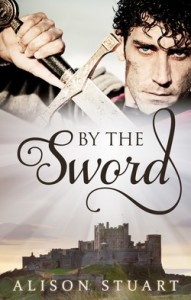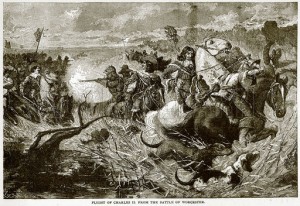Immediately after having agreed with Alison Stuart that I would review* By the Sword I knew a heart-sinking sensation. My sleeves are currently rolled up to market my own seventeenth-century historical novel, Nights of the Road, and I’ve also begun an intense research schedule to create its sequel. So why, I asked myself, had I just committed hours, not only to read but also to publicly review an historical romance by an author whose writing was new to me?

I had no answer other than that I had felt intuitively drawn to Alison Stuart from our brief interchanges on social media. Had I just inadvertently set myself up to wade through chapters of cliché-ridden bared bodices, chiseled chins and saturnine stares? Would I reach the last page only to conclude that my energy could have been more usefully and enjoyably dedicated elsewhere?
I need not have worried. Intuition had not let me down. I was in safe seventeenth century hands.
Stuart’s By the Sword takes place during a pivotal period in that challenging and complex earthquake of a century during which one eighth of the British population died in or as a result of civil war, the country lurched from monarchy to republic and back again, and new ‘men of mechanical and medical sciences’ progressively dominated domains hitherto led by astrologers, alchemists and apothecaries.
Setting her novel around the time of the Battle of Worcester, last battle of the English Civil Wars, Stuart offers a believable historical backdrop and context for a highly readable romance. I found By the Sword’s principal characters endearing enough to warrant spending some hours in their company. And for me the plot was convincingly constructed, and paced in such a way that my attention did not waver. The tale had sufficient twists and turns to see me through to its final chapter still engaged and entertained.
To let you in on the story, I can do no better than offer the book’s blurb, which tells enough without saying too much:
“England 1650: In the aftermath of the execution of the King, England totters once more on the brink of civil war. The country will be divided and lives lost as Charles II makes a last bid to regain his throne.
Kate Ashley finds her loyalty to the Parliamentary cause tested when she inherits responsibility for the estate of the Royalist Thornton family. To protect the people she cares about, she will need all her wits to restore its fortunes and fend off the ever-present threat of greedy neighbours.
Jonathan Thornton, exiled and hunted for his loyalty to the King’s cause now returns to England to garner support for the cause of the young King. Haunted by the demons of his past, Jonathan risks death at every turn and brings danger to those who love him. Finding Kate in his family home, he sees in her the hope for his future, and a chance at a life he doesn’t deserve.
In the aftermath of the Battle of Worcester, Jonathan must face his nemesis, and in turn, learn the secret that will change his life forever. But love is fragile in the face of history, and their lives are manipulated by events out of their control. What hope can one soldier and one woman hold in times like these?”
“What hope indeed?” one may well ask, for there are times aplenty in By the Sword when each of the main characters has reason for hopes to flag. In Kate Ashley, Stuart offers us a sympathetic heroine whose feminine appeal and kind heart attract men, young and old, like bees to a honey pot, while she is also stalwart and tough-minded enough to shoulder some burdensome responsibilities. These include standing up to and even outwitting those who would wish to best her, at least until and unless they resort to brute physical force…
I infer that Stuart may particularly enjoy writing about children, since her Tom and Tabitha are charmingly drawn and their roles each contribute meaningfully to the story. A number of female secondary characters also add color, texture and depth. I much enjoy Alison Stuart’s quiet command of language and the style of her prose. And, as with the book blurb, I find her delicate and discreet use of bedroom scenes enough but not too much.
Stuart has researched her battle history thoroughly. Yet, four centuries on, we can only conjecture what those Royalist officers who loyally surrounded and then shared the fate of the twenty-year-old who already styled himself King Charles the Second in the wake of his father’s execution may have been like.
Would those whom Charles had apparently trusted enough that he gave them important assignments have been intemperate enough to empty the wine cellar of a powerful Roundhead, when the outcome of the battle bringing them to the area was yet to be decided? Could they not have anticipated that the man in question would be both capable and desirous of bringing swift retribution upon their unprotected women, his near neighbors? This seems much more like the prank of unthinking adolescents out to score points than of men described elsewhere as battle-experienced and war-weary.
It perhaps speaks mostly to my own prejudices, but I have read few women writers of historical romance who get inside the skin of their men enough to portray male characters in a way that I experience as authentic. With the hero of By the Sword, Jonathan Thornton, I felt Alison Stuart has made a valiant effort to produce an attractive, multi-faceted and credible leading man.
Her soldier hero has a mysterious and guilty past that weighs him down. For a man with such a heavy conscience, he seems to have learned little and continues to make some poorly considered choices in By the Sword. Yet perhaps Thornton’s ill-starred moves are entirely appropriate to times that, for Royalists, must have been imbued with an overriding sense of fighting ‘a lost cause’. After all, the Battle of Worcester did crush remaining hopes among most supporters of the young King that they could ever regain control and political power in England through military force.
Fortunately for lovers of happy-ever-after endings, whom I guess must make up the majority of Stuart’s readership, if Jonathan can and does make poor decisions, he also retains the capacity to attract women and men loving, loyal and capable enough to go out of their way to save him. So yes, after many wanderings and weavings and workings through of worrying situations, we can at last feel confident that brighter times are in store for all those we have come to care about, by the time the ink dries on the last page of By the Sword.
All in all, I found By the Sword an easy and enjoyable read. As a fellow author, it also gave me to think and reflect more on how we may represent the seventeenth century faithfully and compellingly for today’s readers.
I recommend By the Sword to lovers of historical romance, especially those who are attracted to strong women central characters and novels set in Stuart England and its Civil Wars.
I have only one small gripe, directed toward the editors of Escape Publishing, an imprint of Harlequin Enterprises Australia. As a re-issue of a 2008 award-winning novel, it seems reasonable to expect that this edition would be free of what were, for me, some distracting omitted words, repeated words and even misplaced words (perhaps the result of an over-zealous auto-correct?). For example, I cannot believe that Kate really cast Colonel Price ‘as cold and venal a look as she could muster’. Alison Stuart’s prose and plot are of a quality that deserves editing and proofing to match.
Alison Stuart writes about By the Sword:
“BY THE SWORD is not a new book… it’s actually my very first book with a totally new lease on life. It’s been revised and re-edited to make it what it was always intended to be, the first of a series. There will be three books out this year, the Guardians of the Crown series, covering the years of the Interregnum (1650-1660 – Cromwell and the roundheads). This book is Kate and Jonathan’s story and revolves around the defeat of Charles II at the Battle of Worcester. The hero of Book 2 makes a brief appearance, as does his brother who is the hero of Book 3. Book 3 will bring both books together with the Restoration of the King. It was a dark period of English History – ten years without a King on the throne – but such fun to write about!
BY THE SWORD won the 2008 EPIC Award for Best Historical Romance (as well as being runner up in the Australian equivalent of the Golden Heart). It is the book of my heart! I am so excited that it will finally get the readership it deserves.”
You can learn more about Alison and her other novels at
www.alisonstuart.com
* I received a free copy of By the Sword for review purposes and have received no remuneration for this review.




